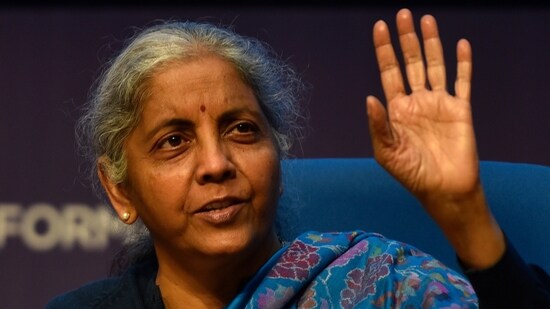GST Council defers tax hike on textiles
The decision, said Union finance minister Nirmala Sitharaman, was taken after Gujarat approached her with a proposal to defer the September decision of the council to put certain textile items under a higher tax slab to correct the inverted duty structure.
New Delhi The Goods and Services Tax Council on Friday deferred its decision to raise tax on textiles from January 1, but the bulk of footwear may become costlier from Saturday as GST on low-end products is set to jump from 5% to 12% on the first day of the New Year.

Union finance minister Nirmala Sitharaman on Friday said the 46th meeting of the GST Council was convened on short notice under the “emergency provisions” after Gujarat approached her with a proposal to defer the September decision of the council to put certain textile items under a higher tax slab to correct the inverted duty structure.
The GST Council on September 17 announced its decision to correct the duty inversion on textiles and the footwear value chain from January 1. The move could have made both garments and footwear costlier as GST on them would have gone up from 5% to 12% in order to correct duty inversion.
Higher duty on raw materials as compared to finished products leads to an inverted tax structure that makes it difficult for manufacturers to claim input tax credit (ITC), and the burden is ultimately passed on to the consumer. ITC allows a GST-registered business to claim levies already paid on inputs before making a final sale of the product and services that aims to prevent cascading of taxes.
The Union finance minister, who is also the chairperson of the GST Council, said at the emergency meeting held on Friday, the Council decided “to retain the status quo” and not to make duty correction from 5% to 12% from January 1 in the case of textiles. “Textile was the only issue of discussion in this emergency meet,” she said.
She said that the committee, which is looking into “rate rationalisation”, will review the issue of tax anomalies in the complex textile sector along with other items and submit its report by February. The report will be circulated to all members before the Council will take up the matter either by the end of February or sometime in March, she added.
At the 45th meeting of the Council on September 17, the apex decision-making body on indirect tax matters also decided to set up two groups of ministers (GoMs) -- one will examine ways to rationalise tax rates and review exemptions to boost revenues and the other to discuss ways and means of using technology to improve compliances.
Bimal Jain, chairman of the indirect tax committee at PHD Chambers of Commerce and Industry (PHDCCI) said, “There is no deferment on GST rate from 5% to 12% on footwear w.e.f. January 1, 2022, which is also one of unorganised sector... this hike in GST rates will make footwear expensive for the common man.”
MS Mani, partner at consultancy firm Deloitte India, said it is necessary to find out a solution to the problems of inverted duty structure in the textile sector. “The decision to roll back the proposed GST rate increase case of the textile products would also make the footwear sector expect a similar treatment in future,” he added.
Sitharaman said although it was a “brief meeting” with “only one agenda” some of the ministers did raise the issue of extending compensation to states beyond June 2022. “We’ve heard them. That wasn’t in the agenda, so there wasn’t any response from our side on that,” she added.
Several states are seeking extension of the indirect tax compensation system beyond June 2022. As the Covid-19 pandemic is far from over, they fear a sudden drop in their GST receipts after the five-year guarantee period will end in June 2022. They want this period to be extended under the unforeseen circumstances by amending the GST law, between two and five years.
At the time of introducing the new indirect tax regime in July 2017, the GST law assured states a 14% increase in their annual revenue for five years, and assured them that their revenue shortfall would be made good through the compensation cess levied on luxury goods and sin products such as liquor, cigarettes, aerated water, automobiles, coal and tobacco.
The textile ministry thanked the PM and the FM for considering the requests of industry stakeholders, especially in the present challenging time when the sector is on the path of recovery.
Get Current Updates on India News, Lok Sabha election 2024 live, Election 2024 along with Latest News and Top Headlines from India and around the world.



